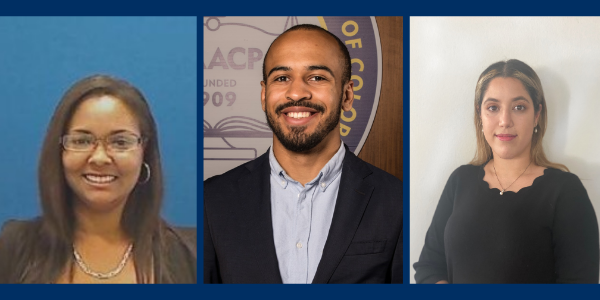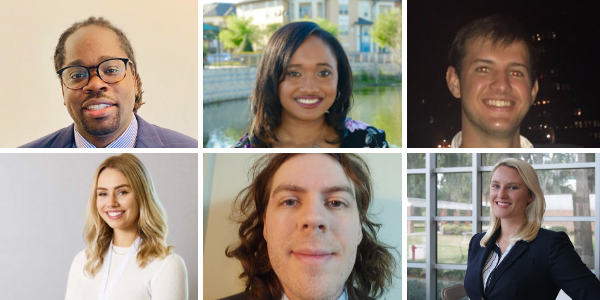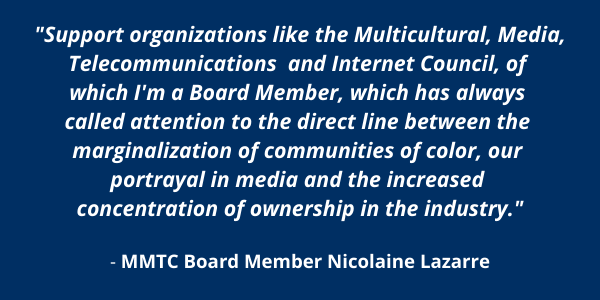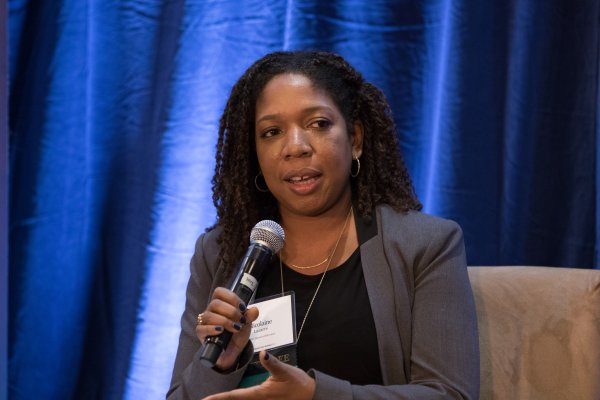
Compelling Need
There is an urgent need for a pipeline of workers, students, and professionals to address the lack of diverse representation and thought leadership in the tech, media, and telecom (TMT) industries.
How MMTC Will Solve the Need
Since opening our doors in 1986, MMTC has worked tirelessly to promote and preserve equal opportunity, civil rights, and social justice in the tech, media, and telecom (TMT) industries. Our fellowship and internship programs have directly trained more than 100 diverse students and professionals, arming them with the tools and sensitivity to advocate to ensure digital inclusion. In 2019 and 2020 alone, we have trained and mentored 28 students and young professionals for careers in tech, media, and telecom. See the list below.

2019 Students and Young Professionals (16)
– Max Ateba, Visiting Senior Fellow, Corporate Development and Business Strategy and FinTech and HealthTech Advisory, St. John’s University
– Jonathan Banks, Benjamin Banneker Academic High School
– Belen Crisp, American University Washington College of Law
– Danielle Davis, Barry University, School of Law
– Talia Desai, Holton-Arms School
– Sarah Diekman, Florida A&M University College of Law
– Jamila Flomo, University of Miami School of Law
– Linay Ashleigh Little, Lake Orion High School
– Justin Nick, Wesley Theological Seminary
– Marissa Perry Sharpe, Syracuse University College of Law
– Nicholas Poppell, Florida State University College of Law
– Sekoia Rogers, American University College of Law
– Margeling Santiago, Florida State University College of Law
– Sabrina Shah, Thomas Sprigg Wootton High School
– Simone Smith, University of Miami School of Law
– Rebekah Watson, University of Miami School of Law
2020 Students and Young Professionals (12)
– Dawn Doughty, Florida International University College of Law
– Oscar Draughn, Florida A&M University College of Law
– Amber Edney, University of Florida Levin College of Law
– Robert Gallinar, Florida International University College of Law
– Savraj Gill, Syracuse University College of Law
– Ashton Hampton, University of Florida Levin College of Law
– DeVaughn Jones, American University Washington College of Law
– Blaire Lakatos, Florida A&M University College of Law
– Adrianna Lopez-Colon, St Thomas University School of Law
– Nick Owen, University of Florida Levin College of Law
– Cierra Pettiford, University of Florida Levin College of Law
– Marissa Zink, Florida International University College of Law
2021 Students (17)
– Dawn Doughty, Florida International University College of Law
– Pia-Milan Green, University of Florida Levin College of Law
– DeVaughn Jones, American University Washington College of Law
– Kishel Stubbs, Florida International University College of Law
– Veronica Devries, Syracuse University College of Law
– Tamonica Jones, Florida Agricultural and Mechanical University College of Law
– Tiana Loving, Florida Agricultural and Mechanical University College of Law
– Mary Kate Pinto, Catholic University of America Columbus School of Law
– Edward Street, Massachusetts School of Law
– Victor Bruzos, University of Miami School of Law
– Veronica Devries, Syracuse University College of Law
– Chelsea Kickingstalion, Florida Agricultural and Mechanical University College of Law
– Terran Lane, Florida Agricultural and Mechanical University College of Law
– Karen Pineda, Florida International University College of Law
– Imani Powell, Florida Agricultural and Mechanical University College of Law
– Matthew Shalna, University of Miami School of Law
– Shakina Williams, Florida Agricultural and Mechanical University College of Law
2022 Students (12)
How You Can Help MMTC
With your support, through our Fellowship and Social Justice and Digital Equity Policy Programs, we can increase the pipeline of diverse workers and professionals and greatly improve our impact in addressing how to support our nation’s most vulnerable communities. in areas such as essential communications and technology access; employment and upskilling, leadership, ownership; and more.
Go here to learn about the Social Justice and Digital Equity Policy Program.
Donate here.
MMTC’s primary programmatic areas for 2020 and beyond are:
– Technology, Privacy, and Civil Rights in the Digital Age
– Infrastructure, Connectivity, and Digital Inclusion
– Media Ownership and Multicultural Media Content Diversity
– Diverse Ownership
– Upskilling Tomorrow’s Workforce
Learn more about MMTC by reading our About Us page, 2021 Annual Report, and Form 990 below.

Special Appeal from MMTC Board Member Nicolaine Lazarre
About the Author: Nicolaine Lazarre is the Senior Vice President and General Counsel of the National Urban League. Lazarre serves as an active and devoted member of the MMTC Board of Directors. A graduate of Georgetown University Law, she has over 20 years of experience in social impact and social entrepreneurship, supplier diversity, commercial law, corporate transactions, governance, and compliance. As an Adjunct Associate Professor of Columbia University’s School of Professional Services, Nicole assisted MMTC in the strategic planning process performed by Columbia University’s Capstone Program for the MA in Nonprofit Management.

We were sitting in a conference room preparing for a meeting our boss had arranged with a potential corporate partner. One of the reps on the guest list was not familiar to us. “I think he’s a lawyer”, I stated, as my colleague reached for her keyboard. A Google search produced a somewhat bookish man in suit and tie, with thick glasses and pale blond hair cut in a conservative style. She sneered and said, “he looks like a lawyer”. And for some reason, on that day, I didn’t laugh. In fact, my heart sank. It was probably a culmination of events that week, including a difficult negotiation where I’d had to stand my ground against a vendor who persisted with incredibly offensive personal attacks. Whatever it was, in that moment, I had no barriers against the thought that rushed in: “I guess lawyers don’t look like me.”
In truth, there are very few positive roles in society where the image of a black female automatically comes to mind. Google any role, from CEO to Journalist and the results rarely reflect my race or gender. Unconscious biases are a fact of life. But working men and women of color face predominantly negative stereotypes that can have serious consequences with respect to their professional, financial, social and law enforcement interactions. To quote Charlene Carruthers, “…anti-Blackness works 24/7 to kill the Black imagination.”
The link between media and civil rights is what drew me to join the Board of the Multicultural, Media, Telecom and Internet Counsel (MMTC). MMTC has long recognized that in order for people of color to enjoy full and fair participation in society, the world must recognize and respect the full breadth, complexity, and talent of our communities. Rather than just targeting content, MMTC has focused on hiring, procurement, governance, ownership, and access to capital as the means of promoting and preserving a positive narrative for people of color in mass media. MMTC is generally recognized as the Tech, Media, and Telecom (TMT) sectors’ leading non-partisan, national nonprofit diversity organization.
Since 1986, MMTC has advanced equal opportunity, civil rights, and social justice in the mass media, telecom, and broadband industries, and to close the digital divide. Read MMTC’s 2019 Annual Report here to learn more about our undertakings here. Some achievements you may not have been aware of:
– Trained over 100 diverse students to become successful telecom attorneys and policy professionals
– Successfully incubated several minority and women broadcast station owners
– Engaged in countless individual engagements and advocacy efforts on behalf of media, broadcasting and technology entrepreneurs, including efforts to encourage and incentivize minority participation in wireless transactions
– Fought tirelessly – and continues to fight — and to close the digital divide and ensure universal broadband access and full digital inclusion
– Helped create and implement a program that has resulted in over 1,000 apprenticeships and/or pre-apprenticeships for underrepresented workers in the telecommunications industry
– Won substantial litigation that has advanced diversity, including holding the Federal Communications Commission accountable for considering diversity proposals that had been tabled for 14 years
– Persistent, tireless work to successfully ban discrimination in advertising transactions – the so called “No Urban, No Spanish” dictates.
– Advocates for diversity in the “c-suite,” diverse governance of tech and media companies, and contracting opportunities for women and minority entrepreneurs
– Led the communications industry in helping to cure access to capital issues plaguing minority TMT entrepreneurs.
– Won relaxation on overseas investments in American broadcasting
– Lends MMTC’s expertise in the Federal Communications Commission’s various Diversity Committees and Broadband Deployment Advisory Committee
Unfortunately, MMTC’s work is still relevant. The Black Lives Matters protests and COVID-19 have revealed the significant inequities that remain in our nation, with minority employment in the tech sector hovering at 3% and 25% of Black teens lacking broadband in the home. Remote work, telehealth, IOT, privacy and cybersecurity solutions, infrastructure investment, smart cities and entrepreneurship in the tech sector will define the economy of the future. Communities of color cannot be left out of another technological evolution as others exploit their consumption while marginalizing their voices. MMTC stands at a crucial juncture amid these significant cultural shifts. It can sunset while its mission is still as relevant and urgent ever, continue to serve as a bridge between civil rights and TMT. We stand ready for the fight, but we need your help.
That’s why I am hoping that we can count on you for a gift to support the Social Justice and Digital Equity Policy Program, MMTC’s initiative to build a stronger, more impactful voice on communications policy issues impacting marginalized communities. Information about the program is available here.
The overall campaign goal is to raise $5 million over the next two years to build MMTC’s budget and capacity to approximately $2.5 million per year. Your name or logo and level of support will be listed in the Annual FCC Commissioners and Awards event, which will be held virtually in the Fall of 2020.
Can MMTC count on you for a pledge of $5,000 or an amount you feel contributing for 2020?
Donate here.
Thank you for considering our request for support and partnership.
Sincerely,
Nicolaine Lazarre